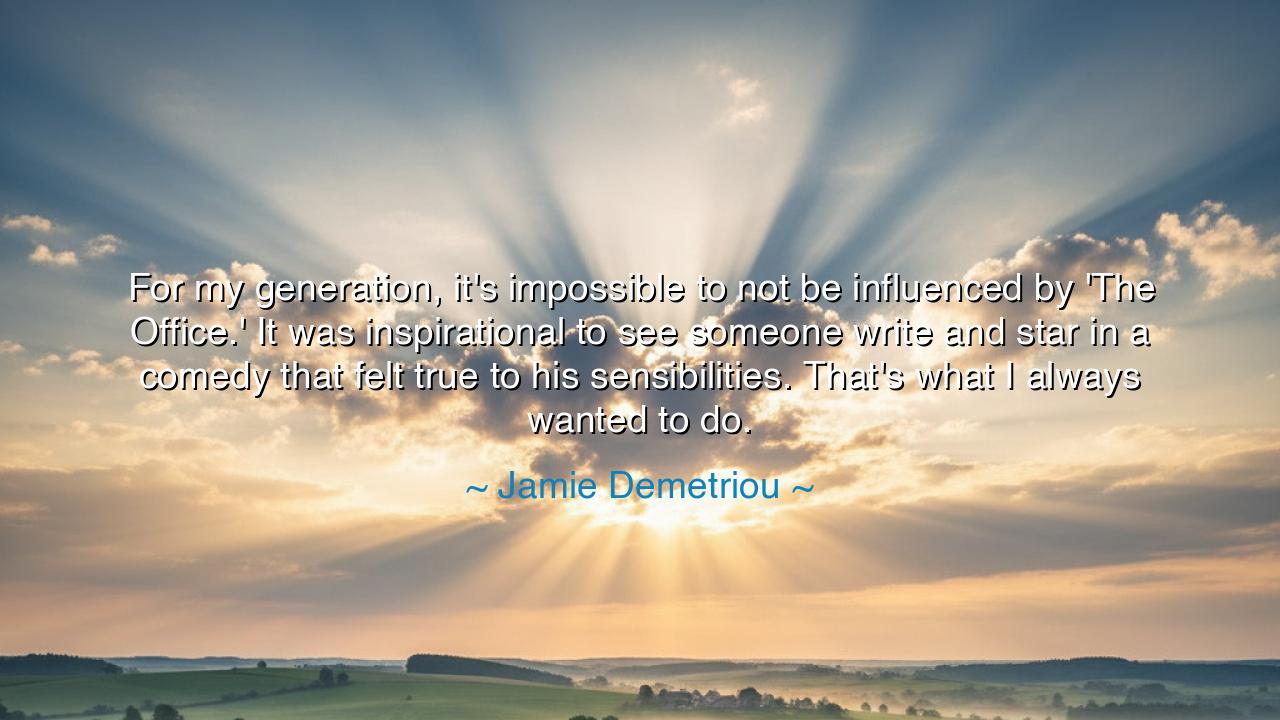
For my generation, it's impossible to not be influenced by 'The
For my generation, it's impossible to not be influenced by 'The Office.' It was inspirational to see someone write and star in a comedy that felt true to his sensibilities. That's what I always wanted to do.






“For my generation, it's impossible to not be influenced by ‘The Office.’ It was inspirational to see someone write and star in a comedy that felt true to his sensibilities. That's what I always wanted to do.” — thus spoke Jamie Demetriou, the modern craftsman of comedy, whose words remind us that authenticity is the soul of creation, and that every artist stands upon the shoulders of those who came before. In this reflection, Demetriou honors not only the brilliance of The Office but also the timeless truth that the greatest inspiration springs from truth itself — from the courage to write, to perform, and to create according to one’s own sensibilities, unshaped by the demands of imitation or conformity.
The origin of this quote lies in Demetriou’s reflections on his artistic journey — a journey that gave the world the eccentric brilliance of Stath Lets Flats, a comedy born from awkwardness, sincerity, and deeply human absurdity. In speaking of The Office, he pays tribute to Ricky Gervais and Stephen Merchant, the minds behind that seminal work of the early 2000s. To Demetriou’s generation — a generation of artists shaped by mockumentary humor, quiet cringe, and subtle truth — The Office was not merely a show; it was a revelation. It proved that laughter could spring not from exaggeration, but from the raw, unvarnished reality of human imperfection. It showed that honesty, when wielded with intelligence and compassion, could be as powerful as any act of invention.
To say it is “impossible not to be influenced” is to acknowledge the reach of art that transcends its time. The Office was more than entertainment; it became a cultural scripture, teaching its viewers that the truest comedy is found not in performance, but in observation. Gervais, by both writing and starring in his creation, embodied the sacred unity between the vision of the writer and the vulnerability of the performer. In him, Demetriou saw a path — a reminder that one’s voice, if honest, could resonate deeply without needing to mimic anyone else’s. Thus, his inspiration was not in the imitation of form, but in the awakening of authenticity.
This truth — that to create is to be true to oneself — echoes through every age. Consider the story of Michelangelo, who once said that every block of stone already contains a statue within it, and that his task was only to release it. So too does the artist of comedy, or of any art, seek to release what already lives within — to carve truth from the marble of experience. When Michelangelo gazed upon his unfinished works, he called them “the prisoners,” bound within stone. Likewise, many artists live as prisoners of influence and expectation, unable to free their own voice. But when one, like Demetriou, sees another who dares to unite vision and action, writing and performance, the chains fall away, and a new form of courage is born.
The lesson within this reflection is not merely about comedy, but about all creation. The world does not hunger for imitation; it hungers for truth in new voices. Every generation inherits the art of its predecessors — the patterns, the rhythms, the forms — but each must rediscover its own sensibility. To be inspired does not mean to copy, but to translate the eternal into the language of the present. The Office taught Demetriou’s generation that humor could be humble, quiet, awkward, and yet profoundly human. It taught them that vulnerability could be a kind of strength, and that authenticity — however small, however strange — could touch the universal.
Yet, Demetriou’s words also carry a challenge. Inspiration is not enough; one must act upon it. To admire another’s truth is only the beginning — to live one’s own is the true work. Every artist, every dreamer, must face the moment when imitation must end, and originality must begin. Demetriou did not seek to remake The Office; he sought to make something equally sincere, equally rooted in his world. This is the calling of all who create — to let the torch of influence light their path, but never dictate their destination.
So, my listener, take this as your charge: be inspired, but be yourself. Learn from the masters, but do not become their shadow. Let their courage awaken your own, and their authenticity remind you of yours. Whether you are an artist, a builder, a teacher, or a dreamer, remember that greatness is born not from imitation, but from truth lived deeply. Find your sensibility, your way of seeing, and shape the world through it.
For in the end, Jamie Demetriou’s words remind us that the artist’s highest calling is not to follow, but to continue. The flame of inspiration burns brightest when it is passed from one generation to the next, each adding its own light. Thus, the dreamer becomes the doer, the admirer becomes the creator, and the influence of truth becomes eternal.






AAdministratorAdministrator
Welcome, honored guests. Please leave a comment, we will respond soon